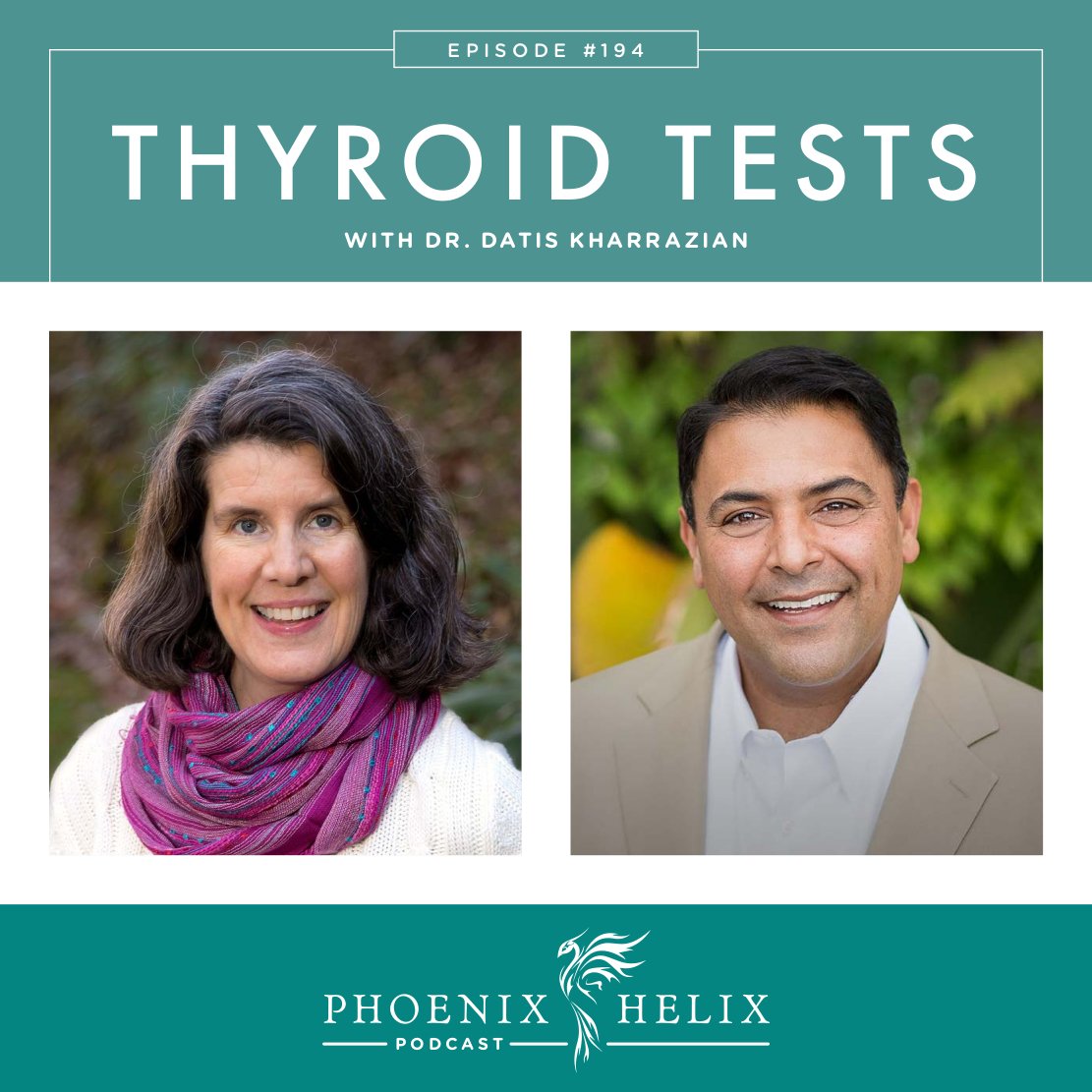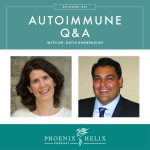
Making Sense of Your Lab Tests
Two of the most common autoimmune diagnoses are Hashimoto’s Disease and Graves’ disease, and they both involve the thyroid. Conventional doctors often run a simple thyroid test as part of an annual physical. The problem is that it doesn’t catch every thyroid problem. Functional medicine physicians run a complete thyroid panel, which gives a more expansive picture, but it’s not always a clear picture. Today, we’re going to go over what each test measures and how to interpret your results. My guest is Dr. Datis Kharrazian, one of my most popular podcast guests. He is an award-winning researcher, clinician, author, and educator. Many of you are familiar with his bestselling book, Why Do I Still Have Thyroid Symptoms When My Lab Tests Are Normal? He has a new online class called Hashimoto’s: Solving the Puzzle.
Listen to the Show
- Subscribe to my podcast through your favorite podcast app: iTunes, Stitcher, Google, TuneIn, Spotify, Amazon, etc.
- You can also listen to the episode right here through the player below, and if you subscribe to my newsletter you’ll get notified of future episodes.
Podcast: Play in new window | Download
Show Notes
- Intro (0:00)
- Thank You to Our Podcast Sponsor – Functional Nutrition Alliance (2:21)
- Full Body Systems is their internationally acclaimed, 10-month online functional nutrition immersion training program.
- It’s designed by world-renowned educator, Andrea Nakayama. Many of you know her as one of my most popular podcast guests. Her unique way of working with patients often leads to results where other practitioners hit dead ends. This program teaches you to do the same.
- If you’re already trained as a health coach, nutritionist, or medical practitioner and want to more effectively help your clients break through healing plateaus, this class is for you!
- And if you’re an aspiring practitioner just getting started, this might be the only training you need.
- You’ll gain detailed knowledge of all the systems in the body, how they interact, how problems develop, and how to personalize diet and lifestyle recommendations for each unique client.
- Enrollment is currently open. To learn more, visit FxNutrition.com/Eileen.
- Dr. Kharrazian’s Journey to Thyroid Expertise (3:48)
- He started his career as a chiropractor and got his master’s degree in clinical nutrition. He ran bloodwork on all of his patients, including a thyroid panel, and that’s when he realized how many people had thyroid problems. The standard model of treatment at that time was to supplement with iodine, selenium, and tyrisine, but his patients didn’t improve.
- So, he went looking for answers and an endocrinology textbook contained a sentence that changed his perspective completely: the majority of hypothyroidism may be autoimmune. He started running thyroid antibodies as part of the thyroid panel, and indeed, his patients with antibodies were the ones who didn’t respond to standard treatment. He changed his focus to treating the underlying autoimmunity. The standard protocol at that time was to address heavy metals and parasites, with the assumption that would lead to remission. He quickly learned it’s not that simple.
- He pursued further education, getting multiple doctorate degrees that focused on health science, immunology, toxicology, autoimmunity, and clinical research. He also maintained a busy clinical practice and noted what did and didn’t work for his patients. He eventually developed a holistic protocol that was more individualized and more successful. That’s when he wrote his book. Over the next decade, he continued to learn more and now has an online class: Hashimoto’s: Solving the Puzzle.
- TSH (9:02)
- TSH (Thyroid-stimulating hormone) is the main test run by conventional MDs. It’s an important test with valuable information, and it’s a reliable test with high specificity and sensitivity. It’s also covered by insurance.
- TSH is actually released by the pituitary gland, and there’s a negative feedback loop between the pituitary and the thyroid. When the thyroid isn’t releasing enough thyroid hormone, the pituitary will increase TSH to try to stimulate thyroid function. So, high TSH indicates hypothyroidism (low thyroid function). Conversely, when the thyroid is overactive and producing too much thyroid hormone, the pituitary will stop producing TSH. So, very low TSH combined with high levels of thyroid hormone in the blood, indicates hyperthyroidism (an overactive thyroid.)
- The conventional treatment for hypothyroidism is usually a prescription for thyroid replacement hormone. TSH levels are checked once a year to determine dosage. The conventional treatment for hyperthyroidism is more complicated.
- Autoimmune disease is the most common cause of both hypothyroidism (Hashimoto’s) and hyperthyroidism (Graves’ disease). Many patients are never told this fact. This is because autoimmunity doesn’t change conventional treatment.
- While TSH is an important test, when it’s the only thyroid test run, doctors can miss other problems related to thyroid function.
- One challenge with a TSH test is that there is no consensus among healthcare practitioners on what levels show hypothyroidism. Recommendations vary between different professional thyroid associations, different practitioners, and different labs. This is true in both conventional and functional medicine. Labs also use different methodologies which may vary results. This is why diagnosis can’t be based on labs alone. That said, most thyroid experts would agree that anything over 4.5 indicates hypothyroidism. And if your TSH number continues to increase every year, that indicates increasing thyroid damage, which means the autoimmunity is not well controlled.
- Always look at lab values in combination with your entire health picture. Sometimes a lower value might still indicate hypothyroidism. However, Dr. K disagrees with anti-aging doctors who try to set very low ranges for diagnosis. It’s not based in scientific research, and can lead to overdiagnosis and overtreatment. If someone’s thyroid is functioning appropriately and they take thyroid medication, there’s a honeymoon phase where they may feel great, but long-term that will cause the thyroid to atrophy and interfere with its ability to produce the hormone naturally. So only people who are truly hypothyroid should receive thyroid hormone prescriptions.
- Using Your Personal Lab Tests as Your Baseline (24:58)
- While there is a lot of disagreement on what’s “normal” or healthy when it comes to lab ranges, there are ways to make your own lab tests more helpful for you.
- First, if possible, always order repeat tests from the same lab. Different labs use different methodologies which can slightly alter the results. Keeping the methodology consistent gives a more accurate picture of your own body.
- Then, watch your own lab values to see how they change in response to treatment, and also how they change over time. They are a helpful tool in a clinical setting for that reason. Don’t compare your lab test results to anyone else’s, but do compare them to your baseline (your original test.)
- Always consider lab tests within the context of your whole health picture. They’re just one piece of the puzzle.
- Thyroid Antibodies (28:19)
- Conventional physicians usually don’t run antibody tests, because it won’t change conventional thyroid treatment. Functional medicine practitioners usually do run antibody tests, because they want to address the underlying autoimmunity. Autoimmune disease is the most common cause of both hypothyroidism (Hashimoto’s) and hyperthyroidism (Graves’ disease).
- There are two antibodies that can be used to diagnose Hashimoto’s: TPO (thyroid peroxidase antibody) and Tg (thyroglobuin antibody). TPO is the enzyme responsible for producing thyroid hormones. Tg is part of the structure of thyroid hormones. Antibodies tag them for an autoimmune attack. People with Hashimoto’s will have either TPO or Tg antibodies (or both). TPO is the most common one, and both can be tested with bloodwork.
- When it comes to Hashimoto’s antibody testing, they are diagnostic and helpful as a personal baseline. However, the range of antibodies can vary greatly from patient to patient. One person might test positive with an antibody level of 70, another person with a level of 700, and another with a level of 1700. That doesn’t necessarily mean the person with lower antibodies is healthier than the person with higher antibodies. Antibodies tag the tissue for the autoimmune attack but don’t actually carry out that attack. T cells are the ones that destroy tissue, and they’re influenced by other things. So antibody levels don’t always signal the severity of the disease or the level of thyroid destruction. Instead of comparing your antibody levels to other people, they’re more helpful as a personal baseline. If repeat testing shows sharply increased levels of antibodies from your baseline, that can indicate disease progression, while decreasing levels may show remission. Dropping within “normal” reference range isn’t the goal. You’ll learn what’s “normal” for you.
- With Graves’ disease, TPO and Tg antibodies are often present, but an additional antibody unique to Graves’ is also present: TSHR (thyroid stimulating hormone receptor antibody), which is also sometimes called TSI (thyroid stimulating immunoglobulin antibody). If that antibody is present, that indicates Graves’ disease. Graves’ disease is much more aggressive, because the antibodies themselves stimulate the release of thyroid hormones. They aren’t just tagging the tissue, they’re interacting with it. For more information on Graves’ disease, listen to podcast episode 159. Hyperthyroidism is usually caused by Graves’ disease. While it sometimes occurs in Hashimoto’s, that’s rare.
- Thank You To Our Podcast Sponsor – Luminance Skincare (37:56)
- This week, I’m highlighting their lip balms, hand cream, and foot cream. When the weather turns cold, the wind is blowing, and the heat is on inside our homes, our skin can suffer. Luminance is here to help! Their hand cream is the perfect balance of a luxuriously thick cream and one that’s fast-absorbing. It replenishes your skin without leaving it greasy. It’s available unscented or lightly scented with lavender essential oil. Their foot cream is formulated to be even richer, and it takes about 10 minutes to fully absorb into your skin. It’s also lightly scented with peppermint essential oil to refresh your feet. And their lip balms glide on smoothly and offer long-lasting moisture to prevent chapped lips. They’re available unscented, or scented with food-grade essential oils: peppermint, vanilla, or lemon.
- Whereas conventional skincare products are full of chemicals that can hurt our bodies, Luminance is made from ingredients that nourish. Their products are natural, organic, wildcrafted, non-GMO, and gluten-free (and they’re even made in a dedicated gluten-free facility). They’re also handmade in small batches within the United States.
- They have a complete face and body care line, including cleansers, toners, moisturizers, masks, acne serum, sunscreen, haircare, and more.
- Place an order here, and use the code HELIX for 10% off your first order.
- Understanding Thyroid Hormones (39:35)
- T4 and T3 are the hormones produced by the thyroid gland. Approximately 90% are T4 and 10% are T3. T3 is the most metabolically active form of thyroid hormone. T4 has some activity but is mostly considered a precursor to T3 and needs to be converted to become active.
- For lab tests, there are markers for Total T4 and T3 vs. Free T4 and T3. When the thyroid produces hormones, it binds them to a protein that allows them to circulate through the body to wherever they’re needed. The protein-bound hormones can’t be used by a cell until that protein is removed. When it’s removed, it’s considered “free” to bind to a hormone receptor site on a cell. Over 99% of thyroid hormones circulating in the human body are bound, and less than 1% are free. Total T4 and T3 lab values are the best reflection of what the thyroid is actually producing, and it’s a stable and reliable test.
- Free T4 and Free T3 levels show the small amount of hormones that have been freed for use, but it’s a very unstable lab value that fluctuates throughout the day. It’s not very reliable. The only time it’s used in conventional medicine is to assess hyperthyroidism. When the thyroid is overactive, more thyroid hormones are unbound and “freed” within the body. Some functional medicine practitioners place too much faith in Free T3 when treating hypothyroidism, not realizing the test is unreliable. Prescriptions should never be based on this test alone.
- When it comes to assessing health and thyroid function, Dr. Kharrazian looks for patterns. There is no one magic test that will tell you everything. While Free T3 and Free T4 aren’t the most reliable tests, they can provide information when combined with other tests and a patient’s full health history. For example, if someone’s TSH, Total T3 and Total T4 are all normal, but their Free T3 and Free T4 are consistently low in repeat tests, that may indicate too much TBG (thyroid binding globulin) blocking those hormones from use. You can test TBG levels to confirm. High TBG can be a side effect of estrogen prescriptions (either birth control or hormone replacement therapy post-menopause). It can also indicate a cyst or tumor that’s increasing estrogen production. Too much TBG can cause functional hypothyroidism even though the thyroid itself is functioning fine.
- Reverse T3 is a lab test that measures the conversion of T4 to T3. We mentioned above that T3 is the more metabolically active form of the thyroid hormone. (Thyroid hormones are made up of thyroglobulins. T4 = 4 thyroglobulins and T3 = 3 thyroglobulins. T4 needs to lose one of those thyroglobulins to convert to T3.) This conversion doesn’t happen in the thyroid. It gets converted in tissues throughout the body with the help of special enzymes called deiodinases. During the conversion process, part of the hormone becomes an inactive form of T3 called Reverse T3 which cannot be used by the body. This happens to everyone, but when there are conversion problems, Reverse T3 levels can go up. This is called underconversion syndrome, and lab tests will usually show normal Total T4, low T3, and high Reverse T3. When this is seen in Hashimoto’s patients, doctors may choose to change the prescription. Most patients are prescribed a T4 thyroid replacement (like Synthroid). But there are other prescriptions that combine T3 and T4, which might work better for anyone with conversion issues. Some potential root causes for these conversion issues are: (1) When the body is experiencing a lot of inflammation and oxidative stress, selenium stores can be depleted because selenium is used by the body to create antioxidants like glutathione to respond to that inflammation. For this reason, selenium supplementation can sometimes be helpful for people with Hashimoto’s. But it’s also important to address the underlying inflammation through diet and lifestyle changes. (2) Latex sensitivity may impact T4 to T3 conversion as well.
- Summary (54:42)
- TSH is the best lab test for determining hypothyroidism.
- T4 and T3 are the hormones your thyroid produces, and they can be measured in their bound (total) and unbound (free) states. Total T4 and T3 tests are reliable. Free T3 and Free T4 tests are unreliable (fluctuating wildly from test to test). You can also measure TBG (levels of thyroid binding globulin).
- Reverse T3 is an inactive form of thyroid hormone that’s created when the body converts T4 into T3 (the more active form of thyroid hormone). If Reverse T3 is high, that can indicate problems with this conversion.
- TPO and Tg antibodies help diagnose Hashimoto’s, the autoimmune disease that’s the most common cause of hypothyroidism.
- TSI/TSHR antibodies help diagnose Graves’ disease, the autoimmune disease that’s the most common cause of hyperthyroidism.
- Diagnoses cannot be made with lab tests alone. You need to look at the big picture, including patient symptoms and health history.
- Lab tests are most helpful when viewed within the context of your unique body – as a baseline and noting any changes with repeat tests.
- Thyroid Ultrasounds (56:10)
- Ultrasounds aren’t commonly used for thyroid patients unless there’s a nodule or mass on the thyroid that can be seen or felt. An ultrasound can help determine if it’s diffuse (like a goiter) or specific (like a nodule). It can also show whether it’s solid (which is more common in malignant masses) or hollow (which is more common with benign cysts).
- Dr. Kharrazian’s Online Course – Hashimoto’s: Solving the Puzzle (57:11)
- A step-by-step online course that walks you through all the steps of identifying the underlying triggers of your Hashimoto’s… and then teaches you what to do about it.
- This online course has 14 parts, and lab tests are just one small part of the larger puzzle.
- Learn more about the course here.
- Outro (58:52)
- Dr. Datis Kharrazian has a patient education website called Drknews.com, and he also teaches practitioners through the Kharrazian Institute. The online class he created for hypothyroid patients is called Hashimoto’s: Solving the Puzzle. His book is called Why Do I Still Have Thyroid Symptoms When My Lab Tests Are Normal?
- Special Note: Many listeners have told me they’d like to leave a positive review in iTunes but don’t know how to do it. I finished today’s podcast with a step-by-step tutorial, and I’ve also included a written tutorial below. If you take a minute to do this, I would be very grateful!
- Eileen (your podcast host) is the author of multiple books, written to help people thrive with autoimmune disease. Learn more on the Books Page.
- If you like this podcast, follow or subscribe through your favorite podcast app. You can also subscribe to Eileen’s biweekly newsletter.
- Check out the entire archive of podcast episodes.
You May Also Be Interested In
Spreading the Word
If you like the podcast, please leave a positive review in iTunes. It would mean the world to me, and also helps others find the podcast. Here are some quick instructions using your iPhone:
- If you are already subscribed to my podcast: (1) Click the purple podcast icon. (2) At the bottom of the screen, click Library. (3) At the top of the screen, click Shows. (4) Click the Phoenix Helix podcast image. (5) Scroll down the page, and you’ll see Ratings and Reviews. Scroll down a little bit more and click on Write a Review. This will bring up the review screen. Tap 5 stars (if you love the podcast), and then click in the title box, and it will bring up the keyboard. Enter a title and short review. (6) Click Send in the upper right corner. (7) Thank you! Positive reviews give the podcast a higher search ranking in iTunes, helping people find it and letting them know it’s a quality podcast and worth their time to listen.
- If you haven’t subscribed to my podcast: (1) Click the purple podcast icon. (2) In the lower right corner, click the magnifying class. (3) Type Phoenix Helix in the search box. (4) Click the podcast cover in the Show list. (5) If you’d like to subscribe, click the + sign at the top of the screen. (6) To write a review, scroll down the page, and you’ll see Ratings and Reviews. Scroll down a little bit more and click on Write a Review. This will bring up the review screen. Tap 5 stars (if you love the podcast), and then click in the title box, and it will bring up the keyboard. Enter a title and short review. (7) Click Send in the upper right corner. (8) Thank you! Positive reviews give the podcast a higher search ranking in iTunes, helping people find it and letting them know it’s a quality podcast and worth their time to listen.







